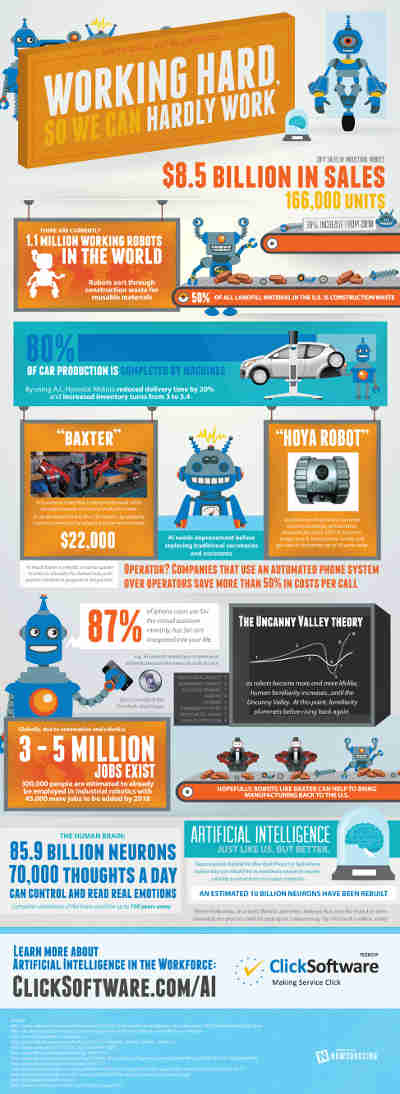| Robots Create Jobs |
| Written by Janet Swift | |||
| Sunday, 12 May 2013 | |||
|
We are still looking forward to the time when robots will take over all the dangerous, unpleasant and boring jobs. But in a time of high unemployment some feel threatened by the prospect. Should we be worried?
This infographic from time management experts, ClickSoftware, estimates that there are well over a million working robots in the world and reminds us that in the automotive industry robots already do most of the work. Click for a hi res version
One statistic that bears more examination is the claim that: Globally, due to automation and robotics 3-5 million jobs exist. This figure comes from a report "Positive Impact of Industrial Robots on Employment" prepared by Metra Martech for the IFR (International Federation of Robotics) and in fact the 3-5 million jobs refers to downstream jobs created by new products and services - in other words, jobs that: would not exist if automation and robotics had not been developed to enable cost effective production of millions of electronic products, from Phones to Playstations. The study put the number of jobs created worldwide by robotics to be 8-10 million of which 2-3 million could be attributed directly to robotics and that some 300,000 jobs were in the robotics industry itself. A recent update to the original report explains that the figures resented were up to 2008 and that once the expansion in the number of robots in use during the period 2008-2011 is taken into account the total number of jobs attributable directly to the use of robots increases by around quarter of a million of which some 50,000 is in the robotics industry. On the basis of the report the IFR concluded: A growth in robot use over the next five years will result in the creation of one million high quality jobs around the world. Robots will help to create jobs in some of the most critical industries of this century: consumer electronics, food, solar & wind power, and advanced battery manufacturing to name just a few. The next generation of robotics puts us on the cusp of another increase in employment in the robotics industry itself. The Report´s authors estimate that 300,000 people are already employed in the industrial robotics sector and an additional 45,000 people will be required by the industry within five years. The service robotics sector is expected to grow even faster than the industrial sector in the medium term and could itself be a major source of future jobs. It seems that in future we should be prepared to share employment with robots, deploying robots where:
In other words we can leave the dirty and dangerous, boring and repetitive jobs to the robots but still expect interesting and rewarding ones for humans.
More InformationRelated ArticlesBaxter Is A Useful Robot - Sort Of Rodney Brooks On Robotics And Baxter Korean Household Robot Prepares Salad
To be informed about new articles on I Programmer, install the I Programmer Toolbar, subscribe to the RSS feed, follow us on, Twitter, Facebook, Google+ or Linkedin, or sign up for our weekly newsletter.
Comments
or email your comment to: comments@i-programmer.info
|
|||
| Last Updated ( Sunday, 12 May 2013 ) |


